► VW Golf GTE long-term test
► Popular PHEV put under the spotlight
► Is it more Golf or more hybrid?
As well as the Count The Cost depreciation panel on this page there could also usefully be a Count Your Blessings element. My final drive in the Golf GTE involved meeting up with Ben Pulman and swapping my calm, comfortable, clever VW for his frantic, fidgety, fast Ford. Not that there isn’t much to be said for the Focus RS, but to enjoy it you need to be on the right sort of journey and in the right frame of mind. If you’re not on a mission, you’re in the wrong car.
The Golf, by contrast, is only sixth-tenths of a hot hatch, but nine-tenths of a very decent compact all-rounder. The cabin isn’t perfect but it is classy, comfortable, decently roomy and reasonably well equipped (in Advance form, which includes sat-nav and heated front seats). The handling could be livelier and so could the engine, but the whole dynamic set-up is responsive and accurate.
And, even though the Golf template is now 40-odd years old, it still looks very smart – and, at night, in white, downright striking, thanks to those C-shaped LEDs, borrowed from the rarely seen e-Golf. Loitering around while photographer Chris Teagles went about his business, not one passer-by was remotely interested in it being a hybrid, but plenty admired it and several asked if it was an all-new model.
Which is the opposite of what it actually is. The Golf elements are part of a long, evolving tradition that’s surely not finished yet. But the hybrid aspect feels temporary; something better will be along soon, whether ‘better’ means lighter batteries, or more range per charge, or something less foreseeable.
The best hybrid cars and PHEVs
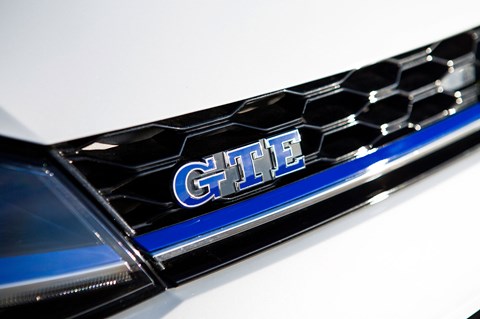
In the here and now, the GTE may be flawed as an electrified future-car, but it’s a painless introduction to living with a hybrid. You can plug it in, or not. You can charge the battery from the engine, or not. You can drive it economically, or not. You can blitz your brain with stats and diagrams showing energy usage, or not.
By the end of our six months with the Golf I was essentially treating it as a petrol car with a big battery and a small boot, and was surprised when every so often I had the opportunity to plug it in and get a few free miles, either of electric-only running (fine in town, but a hopeless lack of top speed on the open road) or mixed petrol and electric running. However often I plugged it in, and however economically I sometimes drove, and however much I tried to fiddle the figures, it never got anywhere near the official combined figure of 157mpg (that’s for the Advance; the smaller-wheeled regular GTE claims 166mpg). Based on our experience you can get around 60mpg rather than 40mpg if you give it a four-hour charge every 100 miles.
As you’d hope when your car is less than 8000 miles old, this GTE still scrubs up very nicely, and everything still feels more or less new. There are, however, a couple of things that want sorting out, namely some loose stitching on the pad of the front passenger seat and a small dent on the rear offside passenger door. No one’s claiming responsibility, but these are damage caused by us, not design flaws.
Check out our Best Hybrids and Plug-In Electric cars list
When you consider the financial advantages (no road tax, thanks to the low CO2 output, and very good benefit-in-kind rates for fleet drivers) you can see why the GTE makes sense. But would you buy this car two owners down the line? You’d have to think twice. Will there be a big bill for replacing worn-out batteries? Will it still be compatible with whatever charging systems are then in operation? Will its electric-only range look even more hopelessly limited than it does today? You wouldn’t need to be much of a gambler to reckon that a petrol or even diesel Golf would be a smarter buy right now.
By Colin Overland
Logbook: VW Golf GTE Advance 1.4 TSI
Price £32,135
As tested £38,510
Engine 1395cc 16v turbo 4-cyl, 148bhp @ 2500rpm, 258lb ft @ 2500rpm, plus 101bhp electric motor (combined maximum 201bhp)
Transmission 6-speed auto, front-wheel drive
Performance 7.6sec 0-62mph, 138mph, 40g/km CO2
Miles this month 387
Total 7799
Our mpg 38.5
Official mpg 157
Fuel this month £55.69
Extra costs None
*Plug-In Car Grant reduces prices by £2500
Count the cost: VW Golf GTE depreciation
Cost new £38,510 (including £6375 of options)*
Private sale price £27,680
Part-exchange price £25,700
Cost per mile 16.7p
Cost per mile including depreciation £1.64
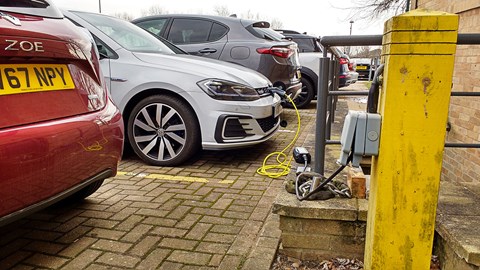
Month 5 of our VW Golf GTE long-term test review: why we rarely plug in
The photo you see here shows that happy but rare sight: a plug-in hybrid plugged in. I don’t think it’s just me who finds the fuss of finding a vacant charger, and then leaving it plugged in for more than three hours in exchange for less than 30 miles of electric-only running, rarely worth the bother.
If the effect of not plugging in vs plugging in was dramatic in terms of petrol consumption, it might become worth the bother. But it’s not. You end up getting something in the region of 37mpg, and 250 miles between £40-ish fills (with about 80 miles of careful petrol-only running still in the tank at that point), come what may.
Yes, it would be possible (for some people) to be very disciplined and plug in at both ends of every journey, and to drive in whichever mode made the best use of the available petrol and electricity on any given journey. But, for me, part of the attraction of a hybrid (plug-in or otherwise) is that you don’t have to worry about this much.
So I’ve made the mental shift to regarding any electricity as a bonus. It’s a petrol car. Sometimes it goes in all-electric mode. Sometimes – good times! – the electricity and the petrol work together. But usually it’s a petrol car.
By Colin Overland
Month 4 living with a Volkswagen Golf GTE plug-in: the driving modes – and meeting an Iranian car industry old-timer
The need to read the handbook is fading. With more miles under my belt, more fill-ups and more plug-ins, I’m feeling much more confident that I know how to use the hybrid Golf, and can judge better when to be in which mode. Pure electric seems right around town. Hybrid feels good on motorways, where the car’s brain seems much more agile than mine in deciding when to use the petrol engine, when to use electric and when to charge the battery.
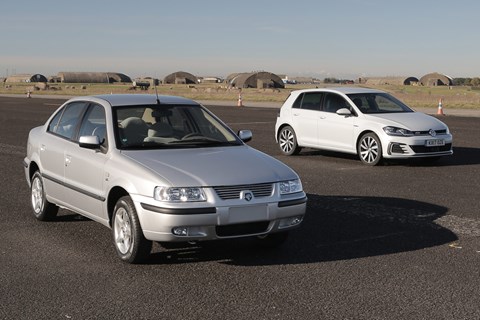
I sometimes use Battery Hold if I know I’m coming up to a town, to ensure I can do some electric-only running when I get there. And Battery Charge feels like you’re putting an unnatural drag on the engine, as if you’re driving in too high a gear or with the handbrake on, so you instinctively avoid that.
A couple of slightly longer trips have helped me appreciate the comfort, refinement and fuss-free nature of the GTE. That refinement was brought home to me back when I spent a day switching between the Golf and an Iranian-produced IKCO Samand (see gallery). Whichever way you compare the two cars, the Samand comes off worse, unless you truly value simplicity for its own sake. Not because the Iranian car is a poor one and not because the German one is brilliant but because the contexts are so far apart. The pace of development in modern cars is so rapid that what we now take for granted is off the charts.
By Colin Overland
Logbook: VW Golf GTE Advance 1.4 TSI
Price £32,135
As tested £38,510 (not including £2500 Plug-In car Grant)
Engine 1395cc 16v turbocharged 4-cylinder, 148bhp @ 2500rpm, 258lb ft @ 2500rpm, plus 101bhp e-motor (combined 201bhp maximum)
Transmission 6-speed auto, front-wheel drive
Performance 7.6sec 0-62mph, 138mph, 40g/km CO2
Miles this month 1725
Total 5964
Our mpg 37.2
Official mpg 157
Fuel this month £428.79
Extra costs None
Month 3 of our Volkswagen Golf GTE long-term test review: poring over the details
We’ve spent the past few months living with the plug-in VW Golf. Time, then, to delve into the minutiae of playing electric Golf…
Don’t forget, you still can’t actually order a new plug-in Golf GTE. Owing to production shortages and the inability of the German factory to build sufficient numbers to meet demand, VW has paused UK sales. Find out more in our explainer here.
How exactly do I charge the VW Golf GTE?

I’m spoilt in having a charger available in the office car park, but I have a lot to learn about charging mid-journey. The first time I tried it, at the Cherwell Valley services on the M40, I had my pick of a row of Ecotricity chargers to plug in to. But after I went through the registration process on my phone, the app told me that it wouldn’t recommend using that charger on that car. Baffling.
Why are the audio controls so tricky?
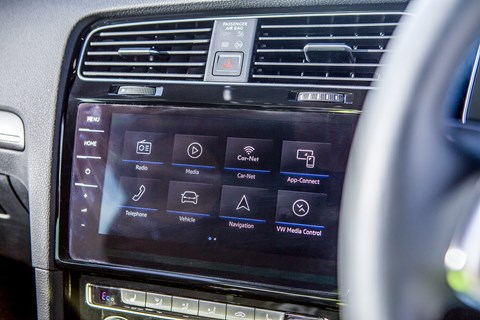
The sound from the audio system is good. But the touchscreen-based system for operating the audio is rubbish. You can’t see the on and volume buttons in the dark. Hitting Source gives you some but not all sources – you have to go to Menu for that. And the USB port (singular) in the ashtray would be fine if you had tweezers for fingers.
Climate change
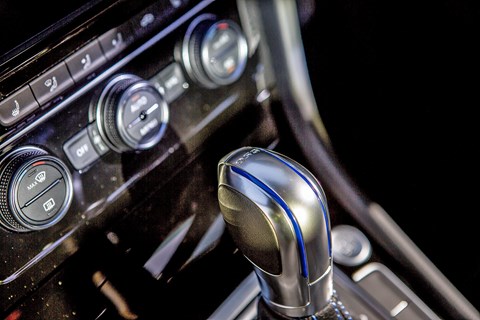
Am I imagining this? In a rather nannyish insistence on saving electricity at all times, the GTE’s rear screen heater seems to switch itself off super-quickly. And the screenwash jets appear to be set at half power. But, absurdly, the car’s happy for you to leave both the heated seats on full power for ages, even if there’s no one sitting in them.
The boot is tiny
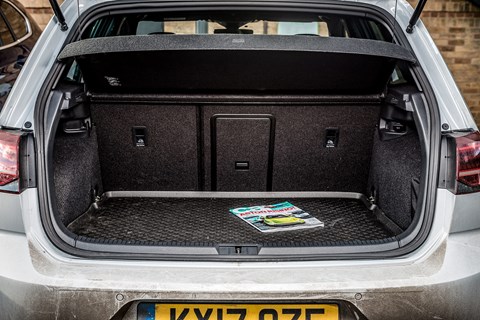
There’s no hybrid version of the Golf estate or Golf SV, so if you want a hybrid Golf you get the hatchback, which has a much reduced boot compared to other engines: 272 vs 380 litres with the rear seats up, 1162 vs 1270 with them down. The Passat and Passat Estate are both available as GTE hybrids, with a lot more boot space than the Golf GTE, but I don’t like Passats – I like Golfs.
Logbook: VW Golf GTE Advance 1.4 TSI
Price £32,135
As tested £38,510 (not including £2500 Plug-In car Grant)
Engine 1395cc 16v turbocharged 4-cylinder, 148bhp @ 2500rpm, 258lb ft @ 2500rpm, plus 101bhp e-motor (combined 201bhp maximum)
Transmission 6-speed auto, front-wheel drive
Performance 7.6sec 0-62mph, 138mph, 40g/km CO2
Miles this month 1725
Total 5964
Our mpg 37.2
Official mpg 157
Fuel this month £428.79
Extra costs None
By Colin Overland
Month 2 living with a VW Golf GTE: juggling the petrol vs hybrid power
Neighbour of mine loves his Lotuses, but his curiosity spreads to pretty much any car with a bit of go about it. The other day I was admiring the under-bonnet view of the Golf GTE, with all its orange electronics, when he wandered over for a chat. I started guffing on about the satisfaction you get from juggling the petrol engine and electric motor so that you maximise efficiency, and the pleasures of whacking it into B mode for some virtual engine braking and actual battery charging.
I was also going on about my habit of trying to get the battery reserve to hit zero the moment I roll into the work car park, knowing that I’ll be able to plug it in and leave it charging all day. And how galling it is to find that all three charging points are occupied.
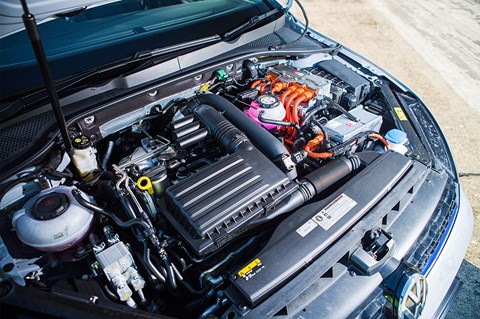
And so on.
Turns out he’d driven a previous-generation GTE. He tolerated my waffle for a bit, and then got to the heart of the matter: ‘Yeah, and then you press the GTE button and you get all the power at once, and that thing flies.’ Ah yes, there is that. A guilty pleasure, among all the greenery, and an explanation for our not-so-good fuel figures.
By Colin Overland
Logbook: VW Golf GTE Advance 1.4 TSI
Engine 1395cc 16v turbo 4cyl, 140bhp @ 5000rpm, 258lb ft @ 2500rpm
Transmission 6-speed auto, front-wheel drive
Stats 7.6sec 0-62mph, 138mph, 40g/km
Price £32,135*
As tested £38,510*
Miles this month 2159
Total 4239
Our mpg 38.6
Official mpg 157
Fuel this month £310.50
Extra costs £0
*Plug-in car grant reduces prices by £2500
Month 1 living with a Volkswagen Golf GTE: paternity test required…
You’ll be familiar with at least one of the many movie versions of Invasion of the Body Snatchers, where aliens take over humans, but you can’t tell by looking at them. (In the case of the Donald Sutherland version, he actually seems to become less alien after he’s been taken over.) That’s the worst-case scenario with the Golf GTE, the plug-in petrol-electric hybrid: looks like a Golf, isn’t.
The best-case scenario is that it looks and feels like a Golf, with the same characteristics and charm and quality and practicality, but it happens to have an electric socket behind the VW badge on the grille. In the same way that diesels came to be an accepted part of the Golf family, why shouldn’t there be a version with a powertrain that incorporates an electric motor?
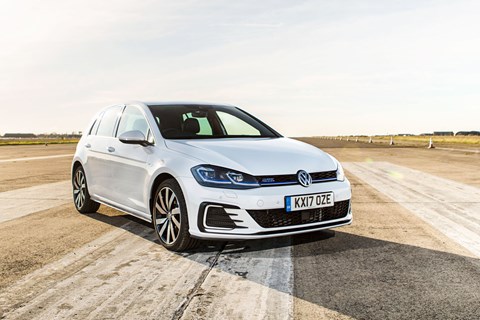
Well, we’ll see. I’ve driven it literally twice so far (after Phil McNamara had it for a couple of weeks, keen to compare it with his family Mini hybrid), and at this stage I’m full of questions. Pompous verdicts will come later, but first impressions are mixed.
Is it just like any other Golf? Head says yes, heart says no. The crucial difference is feel, the intangible quality that makes a Golf feel like a Golf and not like a Leon, Polo or Focus. Driven blind, I’m not sure I’d identify this as a VW, let alone a Golf. Compared to other Golfs, the steering is vague, the ride clunky, the brake pedal both clunky and vague.
And yet it has Golf seats and a Golf steering wheel and there’s a Classic setting for the instruments that makes them look like the dials on any other Golf. But there are also some buttons offering all manner of baffling choices – E mode? B mode? GTE mode? WTF?
There are instrument settings that make it look like the Enterprise in here. The infotainment guys have been having a whale of a time, as if they’ve tried to emulate some of the computer graphics from every sci-fi film they’ve ever liked. For instance, in the climate control screen, there’s a button for something called Pure Air Climatronic. No idea. You press it, and there’s an image of the cabin being slowly filled by an eerie blue light.
Parked up, you could spend a long time fiddling with screens and buttons. And on the road, you could easily distract yourself into a ditch by staring too long at the information coming at you from the many read-outs. I’m going to have to read the manual, or at least watch some videos on the website, before long.
If you want the car to recharge its own battery as it drives along, you can tell it to do that. If you want it to drain the battery, it can do that too. If you want it to reach a happy compromise – and I suspect that’s where all this will end up – then you only need to ask, although as things stand I’m not sure how.

I’m also unclear how to calculate the running costs. Electricity isn’t free (although in this case it’s coming out of our company car park’s charging point, and I’m not going to be billed for it). Assuming that electricity comes from a clean source (and do I have any reason to assume that?), surely it’s cleanest to do as many miles as possible using the battery. But which miles would be best: in town, uphill, or what?
Next month: some answers.
Logbook: VW Golf GTE Advance 1.4 TSI
Engine 1395cc 16v turbo 4cyl, 140bhp @ 5000rpm, 258lb ft @ 2500rpm
Transmission 6-speed auto, front-wheel drive
Stats 7.6sec 0-62mph, 138mph, 40g/km
Price £32,135*
As tested £38,510*
Miles this month 1004
Total 2080
Our mpg 59.4
Official mpg 157
Fuel this month £174.54
Extra costs £0
*Plug-in car grant reduces prices by £2500